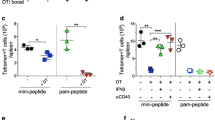Abstract
Nonameric P815AB, a cytotoxic-T-lymphocyte-defined minimal core peptide encoded by the murine mastocytoma gene P1A, fails to initiate CD4+ cell-dependent reactivity in vivo to class-I-restricted epitopes when mice are administered peptide-pulsed dendritic cells. Effective immunization requires T helper effects, such as those mediated by coimmunization with class-II-restricted (helper) peptides or by the use of recombinant interleukin-12 (rIL-12). Although P815AB does possess class-II-restricted epitopes, they are likely suboptimal, resulting in poor affinity and/or stability of MHC/P815AB complexes and inadequate activation of the antigen-presenting cell function of dendritic cells. The present study has examined a series of longer, P815AB-centered peptides (11–14 amino acids in length, all P1A-encoded) for their ability to initiate CD4+ and CD8+ cell-mediated responses to the nonamer in vivo, their ability to bind class II MHC in vitro, and their ability to assemble class II molecules stably. By means of a class-I-restricted skin test assay in mice receiving peptide-pulsed dendritic cells, we found that a 12-mer and a 13-mer effectively immunized against the core P815AB peptide, and that this correlated with IL-2 production in vitro by CD4+ cells in response to the nonamer. In vitro studies, involving affinity-purified class II molecules, showed that the capacity to assemble class II molecules stably, more than the affinity for class II MHC, correlated with the ability of the different P815AB peptides to prime the host to the core peptide seen by the T cells.
Similar content being viewed by others
Author information
Authors and Affiliations
Additional information
Received: 25 February 1999 / Accepted: 14 April 1999
Rights and permissions
About this article
Cite this article
Grohmann, U., Belladonna, M., Bianchi, R. et al. Immunogenicity of tumor peptides: importance of peptide length and stability of peptide/MHC class II complex. Cancer Immunol Immunother 48, 195–203 (1999). https://doi.org/10.1007/s002620050565
Issue Date:
DOI: https://doi.org/10.1007/s002620050565




